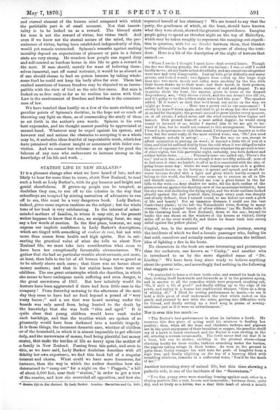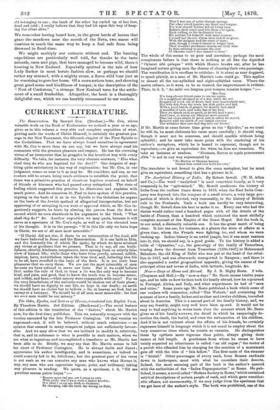STATION LIFE IN NEW ZEALAND.*
Ur is a pleasant change after what we have heard of late, and are -likely to hear for some time to conic, about New Zealand, to read such a book as Lady Barker's, with its gay humour and bright and genial cheerfulness. If grown-up people can be tempted, as -doubtless they can, to run off to the colonies in the way that schoolboys are tempted by stirring narratives of adventure to run .off to sea, this must be a very dangerous book. Lady Barker, indeed, gives some express cautions on the subject ; but the whole tone of her book is very exhilarating. In the interest of sober- minded mothers of families, in whom it may stir, as the present writer happens to know that it can, an emigrating furor, we may say a few words of caution. In the first place, however, we may express our implicit confidence in Lady Barker's descriptions, which are tinged with something of couleur de rose, but not with snore than corms from health and high spirits. But in esti- mating the practical value of what she tells us about New Zealand life, we must take into consideration what seem to have been her exceptionally favourable circumstances. We gather that she had no particular trouble about servants, not more, at least, than falls to the lot of all human beings not so grand as to be utterly above such cares ; that there was no harass about money matters ; and that in her station home there were no children. The one great catastrophe which she describes, in which ahe seems to have undergone much suffering and even danger, is the great snowstorm of 1867. But how infinitely would its horrors have been aggravated if there had been little ones in the -company ! From Saturday morning to the afternoon of the next day they seem to have had no food beyond a pound of "very 7rusty bacon ;" and a cat that was heard mewing under the boards was only saved from being hunted to the death by -the knowledge that she was both "thin and aged." It is -quite clear that young children would have sunk under -such hardships, and that the troubles which are spoken of so ipleasantly would have been darkened into a terrible tragedy.
It .is these things, the incessant domestic care, whether of children -or of the household, in which it is almost impossible to get efficient kelp, and the narrowness of means, food being plentiful but money .Boaroe, that make the burden of life so heavy upon the mother of
• ,11 family in New Zealand. _Passing from this point, and even in
'this, as -we have said, Lady Barker doubtless describes with all delity her own experience, we find this book full of a singular interest and charm. What could we have more humorous, for instance, than the way in which the author describes how she determined to "camp oat" for a night on the " Flagpole," a hill Of about 3,000 feet, near their "station," in order to get a view of the sunrise, and how she overruled all opposition, and how she
"..* &alien Lffe in Nor Zealand. By Lady Barker. London: Macmillan and Co. 1869. repented herself of her obstinacy ? We are bound to say that the party, the gentlemen of which, at the least, should have known what they were about, showed the greatest improvidence. Imagine people going to spend an October night on the top of Helvellyn, which may be taken roughly to represent the camping-out expedi- tion in question, with but one blanket between them, that blanket having ultimately to be used for the purpose of closing the tent- door. Here is a bit of the description of the night of horrors that ensued :- 'I When I awoke I thought I must have slept several hours. Though the fire was blazing grandly, the cold was intense ; I was so stiff I could hardly move ; all my limbs ached dreadfully, and my sensations altogether were new and very disagreeable. I sat up with groat difficulty and many groans, and looked round : two figures wore coiled up like huge dogs near me; two more, moody and sulky, were smoking by the fire, with their knees drawn up to their noses and their hands in their pockets, collars well up round their throats, statues of cold and disgust. To my inquiries about the hour, the answer, given in tones of the deepest despondency, was, Only eleven o'clock, and the sun doesn't rise till six, and it's going to be the coldest night we've had this year.' The speaker added, 'If it wasn't so dark that we'd break our necks on the way, we might go home.' Here was a pretty end to our amusement ! I slowly let myself down again, and tried to go to sleep, but that relief was at an end for the night ; the ground seemed to grow harder every moment, or, at all events, I ached more, and the wind certainly blow higher and keener. Dick proved himself a most selfish doggie ; he would creep round to leeward of me, whilst I wanted him to let me get to lee- ward of him, but ho would not consent to this arrangement. Whenever I heard a deeper moan or sigh than usual, I whispered an inquiry as to the hour, but the usual reply, in the most cynical voice, was, 'Oh! you need not whisper, nobody is asleep.' The fire was no use, except to afford occupation in putting on wood ; it roasted a little bit of you at a time, and that bit suffered doubly from the cold when it was obliged to take its share of exposure to the wind. I cannot say whether the proverb is true of other nights, but this particular night, certainly, was both darkest and
coldest before dawn Presently some one called out, 'There's the sea!' and so it was, as distinct as though it were not fifty miles off ; none of us had seen it since we landed; to all of us it is associated with the idea of going home some day : whilst we were feasting our eyes on it a golden line seemed drawn on its horizon ; it spread and spread, and as all the water became flooded with a light and glory which hardly seemed to belong to this world, the blessed sun came up to restore us all to life
and warmth again Behind me rose a giant forest in the far hills to the wost,—a deep shadow for miles, till the dark outline of the pines stood out against the dazzling snow of the mountains behind it; hero the sky was still sheltering the flying night, and the white outlines looked ghostly against the dull neutral tints, though every peak was sharply and clearly defined; then I turned round, to see before me such a glow of life and beauty ! For an immense distance I could see the vast Canterbury plains; to the left tho Wainaakiriri river, flowing in many streams, like a tangled bunch of silver ribbons' (as Mr. Butler calls it in his charming book on New Zealand), down to the sea ; beyond its banks the sun shone on the windows of the houses at Oxford, thirty miles off as the crow would fly, and threw its dense bush into strong relief against the yellow plains."
Capital, too, is the account of the stage-coach journey, among the incidents of which we find a lunatic passenger who, feeling his feet cold, conceives and actually carries into execution the brilliant idea of lighting a fire in his boots.
No characters in the book are more interesting and picturesque than the cockatoos, one known as "Cocky," and another who is introduced to us by the more dignified name of "Dr. Lindley." We have been long since ready to believe anything about the parrot tribe, and accordingly find nothing in the following that staggers us :—
"It pretended to have a violent tooth-ache, and nursed its beak in its claw, rocking itself backwards and forwards as if in the greatest agony, and in answer to all the remedies which were proposed, croaking out, 'Oh, it ain't a bit of good !' and finally sidling up to the edge of ite perch, and saying in a hoarse but confidential whisper, 'Give us a drop of whisky, do." I liked its sewing performance so much,—to see it hold a little piece of stuff underneath the claw which rested on tho perch, and pretend to sew with the other, getting into difficulties with its thread, and finally setting up a loud song in praise of sewing- machines, just as if it were an advertisement."
Nor is even this too much :— " The Doctor's best performance is when ho imitates a hawk. Ile reserves this fine piece of acting until his mistress is feeding her poultry ; then, when all the hens and chickens, turkeys, and pigeons are in the quiet enjoyment of their breakfast or supper, the peculiar shrill cry of a hawk is heard overhead, and the Doctor is seen circling in the air, uttering a scream occasionally. The fowls never find out that it is a hoax, but run to shelter, cackling in the greatest alarm—hens clucking loudly for their chicks, turkeys crouching under the bushes, the pigeons taking refuge in their house. As soon as the ground is quite clear, Cocky changes his wild note for peals of laughter from a high tree, and finally alighting on the top of a hencoop filled with trembling chickens, remarks in a suffocated voice, 'You'll be the death of me !' " Another interesting story of animal life, but this time showing a pathetic side, is one of the incidents of the "Snowstorm."
"Two fine young ewes were standing leaning against each other in a sloping position like a tent, frozen and immovable ; between them, quite dry, and as lively as a kitten, was a dear little lamb of about a month
old belonging to one ; the lamb of the other lay curled up at her feet, dead and cold ; I really believe that they had hit upon this way of keep- ing the other alive."
We remember having heard how, in the great herds of horses that graze the meadows near the mouth of the Neva, two mares will combine in much the same way to keep a foal safe from being drowned in flood-time.
We might multiply our extracts without end. The hunting expeditions are particularly well told, for thanks to the tame animals, oxen and pigs, that have managed to become wild, there is hunting in New Zealand. Especially spirited is the tale of how Lady Barker in most heroic fashion slew, or perhaps we should rather say stunned, with a mighty stone, a fierce wild boar just as he was rising to gore her horse. Of a more serious tone, and showing great good sense and kindliness of temper, is the description of the "Nest of Cockatoos," a strange New Zealand term for the settle- ment of a small freeholder. Altogether, the book is a thoroughly delightful one, which we can heartily recommend to our readers.































 Previous page
Previous page